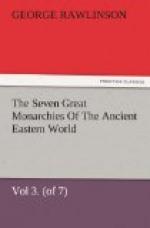or who, having ascended, attempted to quit the heights
and return to the valley. Thus compelled to advance,
his men fought with desperation, and drove the Persians
before them up the slopes of the hill to its very
summit, where the women and children had been placed
for the sake of security. There, however, the
tide of success turned. The taunts and upbraidings
of their mothers and wives restored the courage of
the Persians; and, turning upon their foe, they made
a sudden furious charge. The Medes, astonished
and overborne, were driven headlong down the hill,
and fell into such confusion that the Persians slew
sixty thousand of them. Still Astyages did not
desist from his attack. The authority whom we
have been following here to a great extent fails us,
and we have only a few scattered notices from which
to reconstruct the closing scenes of the war.
It would seem from these that Astyages still maintained
the offensive, and that there was a fifth battle in
the immediate neighborhood of Pasargadse, wherein he
was completely defeated by Cyrus, who routed the Median
army, and pressing upon them in their flight, took
their camp. All the insignia of Median royalty
fell into his hands; and, amid the acclamations of
his army, he assumed them, and was saluted by his
soldiers “King of Media and Persia.”
Meanwhile Astyages had sought for safety in flight;
the greater part of his army had dispersed, and he
was left with only a few friends, who still adhered
to his fortunes. Could he have reached Ecbatana,
he might have greatly prolonged the struggle; but
his enemy pressed him close; and, being compelled
to an engagement, he not only suffered a complete
defeat, but was made prisoner by his fortunate adversary.
By this capture the Median monarchy was brought abruptly
to an end. Astyages had no son to take his place
and continue the struggle. Even had it been otherwise,
the capture of the monarch would probably have involved
his people’s submission. In the East the
king is so identified with his kingdom that the possession
of the royal person is regarded as conveying to the
possessor all regal rights. Cyrus, apparently,
had no need even to besiege Ecbatana; the whole Median
state, together with its dependencies, at once submitted
to him, on learning what had happened. This ready
submission was no doubt partly owing to the general
recognition of a close connection between Media and
Persia, which made the transfer of empire from the
one to the other but slightly galling to the subjected
power, and a matter of complete indifference to the
dependent countries. Except in so far as religion
was concerned, the change from one Iranic race to
the other would make scarcely a perceptible difference
to the subjects of either kingdom. The law of
the state would still be “the law of the Medes
and Persians.” Official employments would
be open to the people of both countries. Even
the fame and glory of empire would attain, in the
minds of men, almost as much to the one nation as
the other. If Media descended from her preeminent
rank, it was to occupy a station only a little below
the highest, and one which left her a very distinct
superiority over all the subject races.




